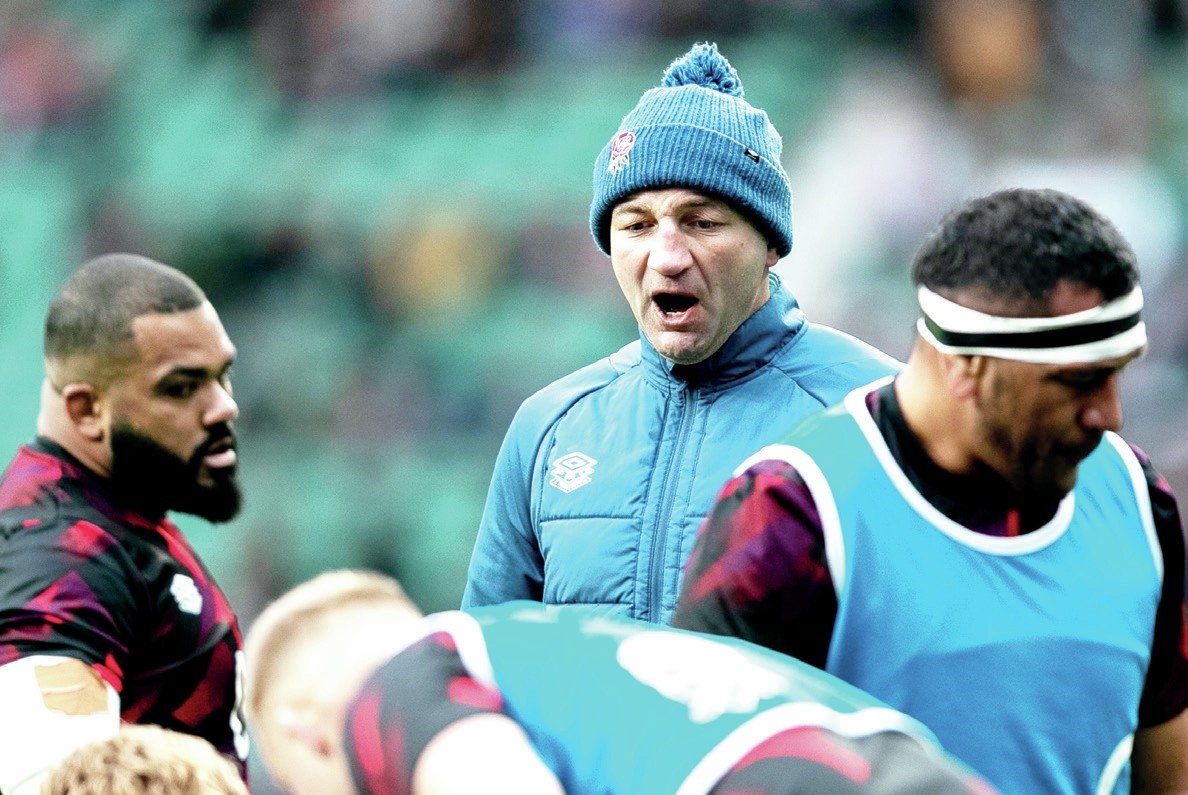
JEREMY GUSCOTT
OUTSPOKEN AND UNMISSABLE… EVERY WEEK

AS soon as Steve Borthwick got the England head coach job he will have been straight into the business of looking at the training schedule for the Six Nations, the World Cup warm-up Tests, and the 2023 tournament itself.
Since then he will have tried to block out the outside noise, assess what Eddie Jones had put in place that he can take forward, and reflect on what he has learned in the very short space of time he has had with the England squad that will make their preparation better.
That preparation begins on Monday when he starts with a June week one camp with players from Premiership clubs not in the play-offs or final, meaning no players from Saracens, Sale, Leicester, or Northampton will be involved. Borthwick has a great deal of World Cup experience, both as an international player as part of the 2007 England squad, and as a coach, having been an assistant to Jones with Japan in 2015 and England in 2019.
In many ways, getting the England squad together in dribs and drabs is not a bad thing, because working with smaller groups of players can often be an advantage.
By this stage all the squad will have been set targets, especially in fitness. That is the first of the big key performance indicators – or KPIs – and they will not do themselves any favours if they are not at the levels of expected of them.
In SAS training in the first few weeks they yomp in the mountains, and that cuts the field because high-level fitness is hard. It hurts, and you cannot cheat. For me, it was always hard graft, but although it hurt you knew it would help you to maximise what you could do on the field.
It is about achieving the right level of base fitness now, and then raising the levels until you are ready to peak in the tournament. In the summer before the 1999 World Cup we had a training camp in Couran Cove in Queensland, before playing Australia in a warmup Test. The aim was to get our conditioning right, and although we lost to Australia it was part of a progression in fitness building towards the tournament.
The main difficulty when you are in camp is keeping the energy levels high because there is the routine of being in the same hotel, the same bed, and around the same people, from the middle of June through to the end of September. However, you can easily turn that into a positive because of the excitement and challenge of being involved in the biggest international tournament in rugby. I played in three World Cups and at none of them did I feel bored or stale.
The reality is that you have got four pool games, and you have to play well, firstly to get to the knock-out stage, and secondly to be picked to play in it. By doing that, you will also have that inner feeling you can beat anyone.

England have come off a poor Autumn series and Six Nations, and Borthwick will know that combining training with four warm-up Tests in August is about striking the right balance between fitness and performance. The England players should be mentally prepared for playing those warmup games against Wales (twice), Ireland, and Fiji, with really heavy legs because of the intensity of the fitness work load.
It is also about getting the right balance between on-field and off-field environments, and that means getting good social secretaries who can sort meals out, music, and a variety of activities – and also change routines surrounding what happens on the way to training, and after it.
The obstacles in bringing any squad together are the same, with injuries, loss of form, and outside noise top of the list. However, being in France should take some of the intensity out of it because it is easier to walk around unnoticed.
Just as life is so often about timing, so is rugby. The players will arrive in camp and been given a personal schedule, including a weights programme, and a running programme, with targets for them to peak at the right time – and after a few weeks off, they will be ready to get going.
It’s interesting how you never hear World Cup winners complaining about their pre-tournament training – it’s the losers who are generally making the excuses. There’s always a lot of noise about too much training sapping the players, whether it was South Africa’s Camp Staaldraad horror story boot-camp before the 2003 World Cup, or Ireland being knackered in 2019. All I know is that those who win it don’t complain.
With the advances made in sports science it is embarrassing for a professional player not to be physically fit – but the psychology of high-performance is something else, because it is so individual. That is why you cannot ‘psych’ a whole team into being in-form. How you feel is how you play, and we have all seen how some players hit a vein of form when they can do no wrong – whether it was Beauden Barrett in 2015, or Antoine Dupont now.
To get everyone in a squad to peak in unison at the right time is not easy, and it will probably only happen for two teams in the 2023 World Cup.
Part of it is the ability of head coaches like Borthwick to anticipate training ups and downs and be intuitive in handling them. If it is a bad session full of mistakes does a coach take hours to drill it in, or does he say, ‘okay, let’s finish’?
That’s about feel. It is about asking: ‘Am I going to get them better by beasting them now, or do we start fresh again tomorrow?’ That’s where it can go wrong because if every specialist coach takes 10 more minutes than on the training schedule, by the end of the day it grinds on the players.
It is far better to train shorter and sharper than longer and poorer.
Another issue is that I don’t think this England team has developed its own culture yet. Traditionally, England have been a strong set-piece team, which kicks either more or less depending on its other abilities. For example, the 2003 world champion team could either run or kick, because they didn’t have a weakness.
Borthwick has said this England team is not fit enough, and he and his coaches should make it a big part in setting out the squad culture. The starting point has to be that everyone is prepared to give everything that they’ve got.
It means that if a player is not fit enough – however big the name, or influential – they cannot remain in the squad. You cannot back down on the targets you set, because if you let it go for one, then you’ve got to let it go for the rest. The next thing is your standards have gone, and you’ve nothing to build from.
It is time for England to get serious.


International Rugby
Rory Darge eager to test himself against Fiji’s ‘benchmark for physicality’

British and Irish Lions
British and Irish Lions hoping Blair Kinghorn can resume training next week ahead of first Test

British and Irish Lions
Trust me, he’s gonna be fine – Ben Earl backs Owen Farrell to roar for British and Irish Lions

International Rugby
Scotland focused on big picture with Fiji clash key to world ranking


























You must be logged in to post a comment Login